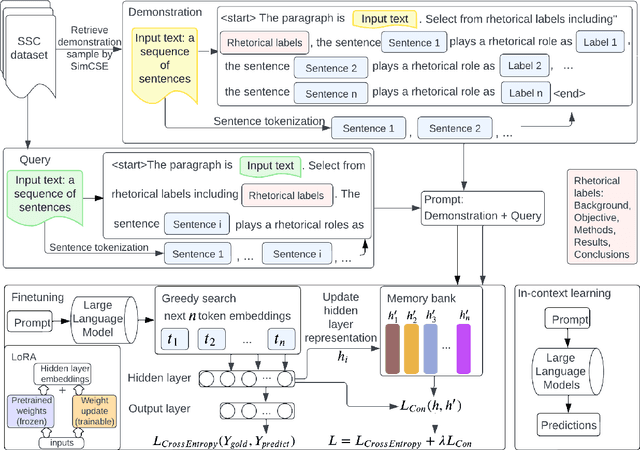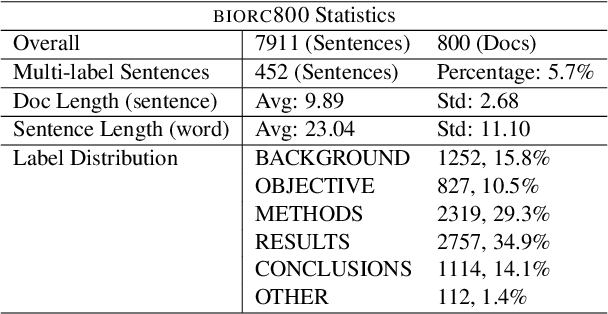Mengfei Lan
Multi-label Sequential Sentence Classification via Large Language Model
Nov 23, 2024



Abstract:Sequential sentence classification (SSC) in scientific publications is crucial for supporting downstream tasks such as fine-grained information retrieval and extractive summarization. However, current SSC methods are constrained by model size, sequence length, and single-label setting. To address these limitations, this paper proposes LLM-SSC, a large language model (LLM)-based framework for both single- and multi-label SSC tasks. Unlike previous approaches that employ small- or medium-sized language models, the proposed framework utilizes LLMs to generate SSC labels through designed prompts, which enhance task understanding by incorporating demonstrations and a query to describe the prediction target. We also present a multi-label contrastive learning loss with auto-weighting scheme, enabling the multi-label classification task. To support our multi-label SSC analysis, we introduce and release a new dataset, biorc800, which mainly contains unstructured abstracts in the biomedical domain with manual annotations. Experiments demonstrate LLM-SSC's strong performance in SSC under both in-context learning and task-specific tuning settings. We release biorc800 and our code at: https://github.com/ScienceNLP-Lab/LLM-SSC.
Zero- and Few-Shot Event Detection via Prompt-Based Meta Learning
May 27, 2023Abstract:With emerging online topics as a source for numerous new events, detecting unseen / rare event types presents an elusive challenge for existing event detection methods, where only limited data access is provided for training. To address the data scarcity problem in event detection, we propose MetaEvent, a meta learning-based framework for zero- and few-shot event detection. Specifically, we sample training tasks from existing event types and perform meta training to search for optimal parameters that quickly adapt to unseen tasks. In our framework, we propose to use the cloze-based prompt and a trigger-aware soft verbalizer to efficiently project output to unseen event types. Moreover, we design a contrastive meta objective based on maximum mean discrepancy (MMD) to learn class-separating features. As such, the proposed MetaEvent can perform zero-shot event detection by mapping features to event types without any prior knowledge. In our experiments, we demonstrate the effectiveness of MetaEvent in both zero-shot and few-shot scenarios, where the proposed method achieves state-of-the-art performance in extensive experiments on benchmark datasets FewEvent and MAVEN.
 Add to Chrome
Add to Chrome Add to Firefox
Add to Firefox Add to Edge
Add to Edge